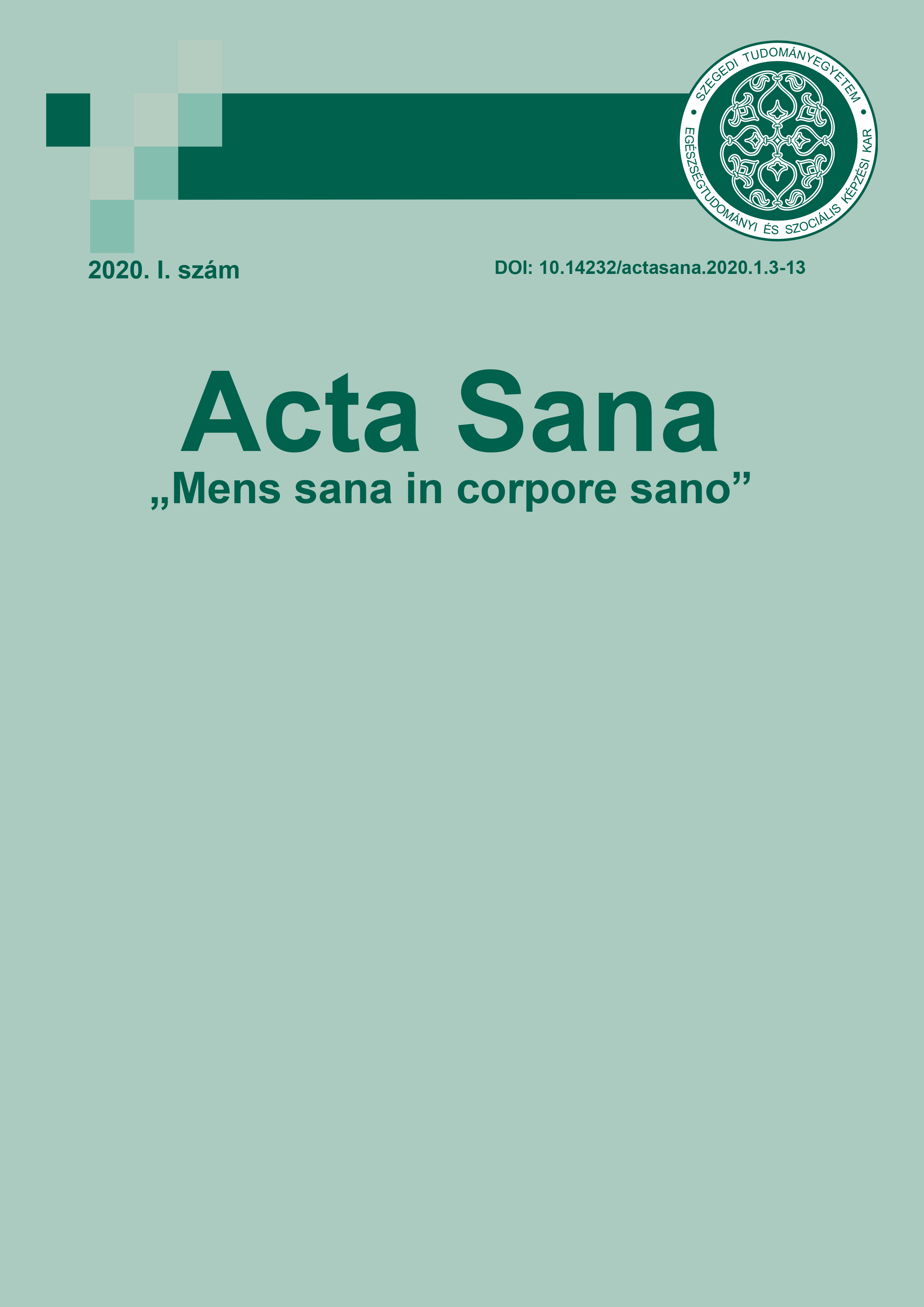A kulturális különbségeken túl nemi reprezentációk és nemi identitás fenyegetettség kapcsolata a roma és nem-roma társadalomban Magyarországon
Main Article Content
Abstract
How we think about men and women is deeply rooted in social and ideological context. The different roles and identities of our content are social processes, and are the result of consensus formed by the members of society through communication. The broader ideological context in society influences not only the contents of gender, but their potential dynamics as well.
We have investigated the construct of gender and its relation to different identity states threat between Roma and non-Roma people. We also examined how both gender’s representation and identity threat are related to socio-economic positions (education, residence, income, employment), moreover, what kind of constructions can threat the gender identity.
We conducted a comparative study with 288 participants. We used associative network for the representation of gender, and measured identity threat and distancing with MTP-Questionnaire.
We obtained differences on gender representations among the minority and the majority members. Roma participants have a more conservative gender representation, and non-Roma have a more diverse gender representation. The differences between these groups are also rooted in educational setting and socio-economical status (where Roma people suffer disadvantages), and gender identity threat is beyond culture. We realized that people generally feel threatened by social expectations and/or social representation about their own gender.
So we can compile that the stereotypical gender perspective is affected by many demographic factors, such as education, type of residences, work, and earnings. But the threat of gender identity, as well as other identity threats, reflects a socially constructed identity to content and value.
Article Details
References
Brannen, J. 2003: Changing family and generational patterns: a comparative assesment of fatherhood. In: Chisholm, L. – A. de Lillo – C. Leccardi – R. Richter eds.: Family forms and the young generation in Europe. Ein Tagungsband der europäischen Beobachtungsstelle zur sozialen Situation, Demographie und Familie am ÖIF. ÖIF– Materialsamlung Heft 16. pp. 23–36.
Breakwell G.M. (1986): Coping with threatened identities. Methuen, London
Breakwell G.M. (1993): Social representations and social identity. In: Papers on Social Representation. Vol. 2, No. 3, 198-217
Duveen G. (1993) The development of social representations of gender In. Papers on Social Representations Vol. 2 (3), 1-177
Duveen, G. (2000). Representations, Identities, resistance. In K. Deaux and G. Philogene (Eds.), Social Representations: Introductions and Explorations. Oxford: Blackwell.
François-Xavier Bagnoud Center for Health and Human Rights (2014): Accelerating Patterns of Anti-Roma Violence in Hungary, Harvard School of Public Health and Harvard University, Boston
Geambasu Réka (2003): A kolozsvári roma elit kialakulásának folyamata. In: Erdélyi társada- lom, 4: 67–85.
Giddens, Anthony (2008): Szociológia. Osiris Kiadó, Budapest
Jovchelovitch, S. (1996): ‘In defense of representations’. Journal for the Theory of Social Behaviour, 26, 2, 121–135.
Koncz Katalin (1987): Nők a munkaerőpiacon, Közgadasági és Jogi Könyvkiadó, Budapest
KSH: Munkaerőpiaci helyzetkép, 2014-2018. http://www.ksh.hu/docs/hun/xftp/idoszaki/munkerohelyz/munkerohelyz17.pdf utolsó letöltés: 2019.03.05.
Margón Kívül (2016): Margón Kívül – magyar ifjúságkutatás 2016, szerk.: Nagy Ádám, Excenter Kutatóközpont
Maslow, A.H. (1954). Motivation and personality.(3rd ed.) New York, Longman.
Moscovici, S. (1961): La psychoanalyse, son image et son public. Presses Universitaires de France, Paris.
O’Neil, J. M. (1981, b): Patterns of gender role conflict and strain: The fear of femininity in men’s lives. The Personal and Guidance Journal, 60, 203-210.
O’Neil, J.M. (1981, a):: Male sex-role conflicts, sexism, and masculinity: Psychological implications for men, women and the counseling psychologist. The Counseling Psychologist, 9, 61-80
Pongrácz–S. Molnár: (2011) Nemi szerepek és a közvélemény változásának kölcsönhatása In Nagy Ildikó - Pongrácz Tibomé (szerk.): Szerepváltozások. Jelentés a nők és férfiak helyzetéről 2011. TÁRKI, Budapest, 192-206.
Ratinaud, P. (2009). IRAMUTEQ: Interface de R pour les Analyses Multidimensionnelles de Textes et de Questionnaires (Computer software). http://www.iramuteq.org
Safaa, L., Housni, K.E. and Bédard, F. (2017) Authenticity and tourism: what Tripadvisor reviews reveal about authentic travel to Marrakech. In: Schegg, R., Stangl, B. (Eds). Information and Communication Technologies in Tourism. Springer, Cham. pp. 595-606.
Schadt Györgyné (2005): A "házi tücsöktől" a dolgozó nőig - az individualizációs folyamatok hatása a családi szerepekre. In: Palasik M, Sipos Balázs (szerk.) Házastárs? Munkatárs? Vetélytárs?: a női szerepek változása a 20. századi Magyarországon. Napvilág Kiadó, Budapest pp. 156-168.
Schadt Mária, Pótó Zsuzsanna (2014): A strukturális változások hatása a nők társadalmi szerepeire és a családszerkezet átalakulására. In: Spéder Zsolt (szerk.) A család vonzásában: Tanulmányok Pongrácz Tiborné tiszteletére. KSH Népességtudományi Kutatóintézet, Budapest, pp. 217-244.
Schaefer, Richard T. (1998): Racial and Ethnic Groups. USA: Longman
Siegler, A., Bigazzi, S., Serdült, S. Bokrétás, I., Takács, B. (2017) Measuring prejudice with a focus on identity threat (poszter) Annual Scientific Meeting of the International Society of Political Psychology (ISPP). 2017. június 29- július 2. Edinburgh
Sullerot, Evelyn: A női munka története és szociológiája Gondolat, Budapest 1971.
Társadalmi Konfliktusok Kutatóközpont (2013): Digitális Konfliktus Adatbázis, Cigányellenesség, ma a cigányokról alkotott kép, http://konfliktuskutato.hu/index.php?option=com_content&view=article&id=367:ciganyellenesseg-ma-a-ciganyokrol-alkotott-kep-a-mai-magyarorszagon&catid=44:rasszizmus&Itemid=216 (utolsó letöltés: 2019.03.05.)
Wagner Wolfgang – László János (2003): History, identity and social representations as theriteical perpectives in a societalpsychology. In: László János – Wagner Wolfgang (szerk): Theories and controvers in societal psycology. Új Mandátum, Budapest. 7-12.

